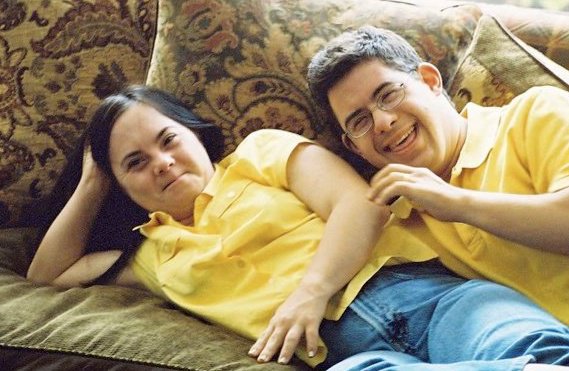
Almost five years ago, when Nathan was still a baby, the documentary Monica & David premiered on HBO. The film tells the story of a man and woman, each of whom have Down syndrome, and the events surrounding their wedding and first year of marriage. When it first aired, I watched it and found it powerful, moving, and somewhat challenging. This past week, I discovered that Monica & David is now available streaming on Netflix, so I decided to watch it again.
Although the film was familiar, in some ways it felt brand new.
When Nathan was a baby, I knew that he had Down syndrome, and I knew what the books said about his prospects. I knew that he would have developmental delays, and I worried about society’s reception of him. I knew he might always live with us, might never drive, and all the rest.
But there was a lot I didn’t know.
Sure, he was a happy baby with a mischievous twinkle in his eye, but we hadn’t yet seen his desire for order, structure, and routine. We hadn’t pushed him into the outside world away from us. We hadn’t struggled to offer him choices, never knowing for sure if he understood the question. We hadn’t seen his limitations emerge.
Watching Monica & David again, this time with a few years of experience behind me, opened my eyes to things I hadn’t noticed before. Monica’s strong need for order and routine was something that struck me as very much like Nathan. He demonstrates this need in many ways, but one of the most common is at night. If everything isn’t how he expects it to be when he goes to bed, he’ll get up, though usually not right away.
It’s not unusual for him to do so if Mr. Andi or I aren’t home when he goes to bed, but the most frightening incident was several months ago at my friend Katie’s house. Her dad kept him (and put him to bed) while we were running in the Wine & Dine Half Marathon, a night race. In the wee hours of the morning, he came downstairs and found his way outside. I found him in his pajamas in the misting rain, standing by my car in the driveway.
Monica’s method of making choices also grabbed me.
We’ve noticed that when we offer Nathan multiple options, he’ll often (but not always) pick the last one he heard. As a result, we’ve found ourselves asking a lot of questions twice, but reversing the options (…Do you want milk or juice?…pause…Would you rather have juice or milk?…) in an effort to ascertain what he truly wants. Monica’s mother suggests Monica does so because she wants to please. I’m not sure if that’s true for Nathan, but it could be.
The film reminded me that often, it’s difficult to understand the mind of our loved ones with Down syndrome.
In some ways, Nathan is an open book, but in other ways he is a complete mystery. Never does a day go by that I don’t wonder what’s going on in his head that I will never know or understand. I also struggle with knowing how much he understands of what I say to him. At times, he seems to know exactly what I mean; at other times, I feel as if I’m expecting too much in believing he understands me.
I saw myself in Monica’s mother, Maria Elena, who was determined, devoted, fiercely protective, and overcome at times with fear for her child’s future. The one thing I felt I had that she didn’t was greater optimism about the prospects for my child’s employment and other opportunities. Ironically, the reason I am able to be optimistic is because, years ago, women like Maria Elena paved the way for mothers like me in an era when inclusion for people with intellectual disabilities was extremely rare.
If you haven’t seen Monica & David , I urge you to watch it, and if you have…watch it again.
Have you seen the film? What did you think? Tell me in the comments.

Hi Andi,
What a beautiful blog post. I’ve never seen Monica and David, but now I’m really intrigued. Your blog is lovely. Can’t wait to meet you at Edel!
Let me know what you think of it!
I think they are cute together.